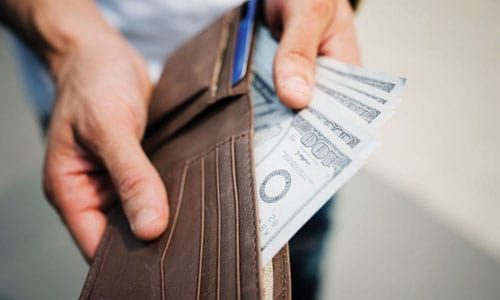
The True Cost Of That Cash Advance
Okay, so you’re all geared up for that once-a-year fling at your friend’s beach house in Key West. Here’s the catch: you’ll need to chip in on the rental fee. What if you don’t have any cash on you? You may think that taking out a cash advance on your credit card is the perfect solution. What’s a little debt compared to a week in the sun with good friends, good food and good drink?
Stop right there.
More often than not, a cash advance is the most expensive way to pay for something, not to mention the dreaded “gateway” to unshakeable debt. That’s because there are several costs associated with cash advances that oftentimes make them more expensive than other types of loans.
Let’s Talk About Fees
For starters, if you take a cash advance using a bank credit card, you will probably pay an ATM fee. The money that you advance will also be charged a higher interest rate than you typically pay on your card – check your credit card paperwork to see exactly how high your rate will be. Plus, most credit card lenders will charge you interest from the day you take the advance, unlike when you make a regular purchase on your card. (Purchases are often given a 25-day grace period before the interest kicks in.)
Your credit union probably offers cash advances on certain loan products, and typically there is no charge for the service. Your credit union may not even charge you a higher interest rate for the advance, either. But even if you have a credit union credit card, it’s still wise to use cash advances in emergencies only, since they are just another form of debt.
Avoiding The Urge To Advance
Think about it: if you don’t have the dough you need to pay for your share of the beach house, where will you get the money from to pay off the cash advance? Will you work more hours at a part-time job? Or take on small odd jobs from friends and neighbors? If this is your plan, there is a chance it may backfire. What if you can’t find enough cash to repay your advance? It’s a scary thought.
The bottom line is that any cash you borrow must be repaid as quickly as possible so that your credit rating remains intact. Not paying your bills or making only the minimum payments on your credit cards can lower your credit score – and as you already know, that will lead to borrowing problems in the future.
So be smart and save up for that sweet vacay instead of taking out an expensive, and risky, cash advance. After all, paying in cash is always less expensive than taking out a loan!
Stop right there.
More often than not, a cash advance is the most expensive way to pay for something, not to mention the dreaded “gateway” to unshakeable debt. That’s because there are several costs associated with cash advances that oftentimes make them more expensive than other types of loans.
Let’s Talk About Fees
For starters, if you take a cash advance using a bank credit card, you will probably pay an ATM fee. The money that you advance will also be charged a higher interest rate than you typically pay on your card – check your credit card paperwork to see exactly how high your rate will be. Plus, most credit card lenders will charge you interest from the day you take the advance, unlike when you make a regular purchase on your card. (Purchases are often given a 25-day grace period before the interest kicks in.)
Your credit union probably offers cash advances on certain loan products, and typically there is no charge for the service. Your credit union may not even charge you a higher interest rate for the advance, either. But even if you have a credit union credit card, it’s still wise to use cash advances in emergencies only, since they are just another form of debt.
Avoiding The Urge To Advance
Think about it: if you don’t have the dough you need to pay for your share of the beach house, where will you get the money from to pay off the cash advance? Will you work more hours at a part-time job? Or take on small odd jobs from friends and neighbors? If this is your plan, there is a chance it may backfire. What if you can’t find enough cash to repay your advance? It’s a scary thought.
The bottom line is that any cash you borrow must be repaid as quickly as possible so that your credit rating remains intact. Not paying your bills or making only the minimum payments on your credit cards can lower your credit score – and as you already know, that will lead to borrowing problems in the future.
So be smart and save up for that sweet vacay instead of taking out an expensive, and risky, cash advance. After all, paying in cash is always less expensive than taking out a loan!
